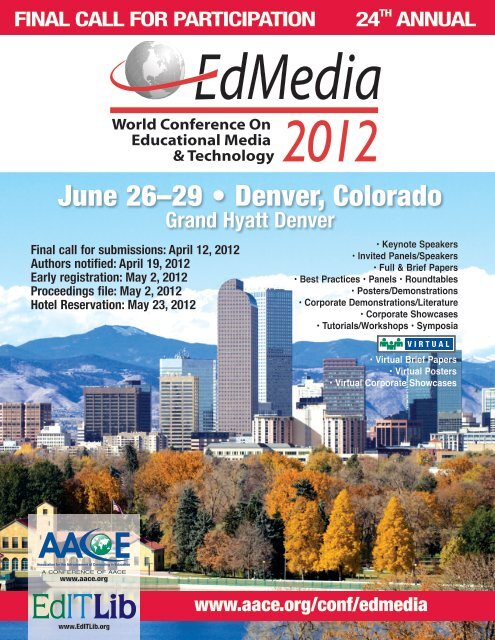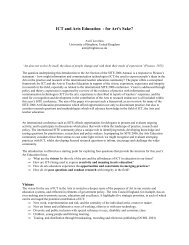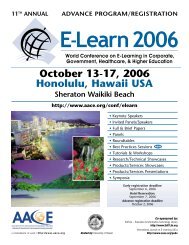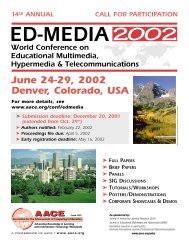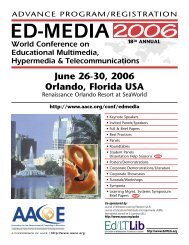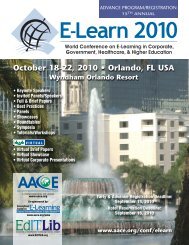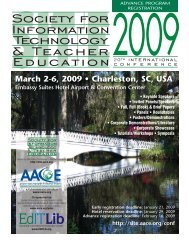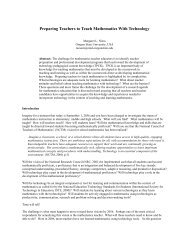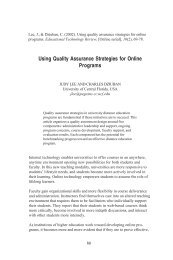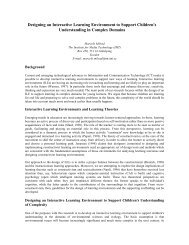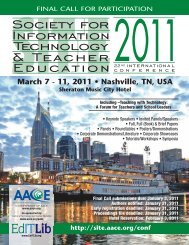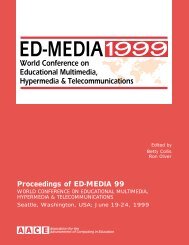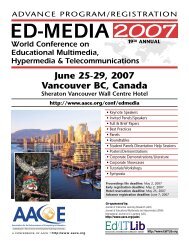World Conference On Educational Media & Technology 2012
World Conference On Educational Media & Technology 2012
World Conference On Educational Media & Technology 2012
Create successful ePaper yourself
Turn your PDF publications into a flip-book with our unique Google optimized e-Paper software.
FINAL CALL FoR PARtICIPAtIoN<br />
24 tH ANNuAL<br />
<strong>World</strong> <strong>Conference</strong> <strong>On</strong><br />
<strong>Educational</strong> <strong>Media</strong><br />
& <strong>Technology</strong> <strong>2012</strong><br />
June 26–29 • Denver, Colorado<br />
Grand Hyatt Denver<br />
Final call for submissions: April 12, <strong>2012</strong><br />
Authors notified: April 19, <strong>2012</strong><br />
Early registration: May 2, <strong>2012</strong><br />
Proceedings file: May 2, <strong>2012</strong><br />
Hotel Reservation: May 23, <strong>2012</strong><br />
• Keynote Speakers<br />
• Invited Panels/Speakers<br />
• Full & Brief Papers<br />
• Best Practices • Panels • Roundtables<br />
• Posters/Demonstrations<br />
• Corporate Demonstrations/Literature<br />
• Corporate Showcases<br />
• Tutorials/Workshops • Symposia<br />
• Virtual Brief Papers<br />
• Virtual Posters<br />
• Virtual Corporate Showcases<br />
a conference of aace<br />
www.aace.org<br />
www.EdITLib.org<br />
www.aace.org/conf/edmedia
INvItAtIoN<br />
ED-MEDIA <strong>2012</strong> – <strong>World</strong> conference on educational Multimedia, Hypermedia &<br />
Telecommunications is an international conference, organized by the association for the advancement of<br />
computing in education (aace). This annual conference serves as a multi-disciplinary forum for the discussion<br />
and exchange of information on the research, development, and applications on all topics related<br />
to multimedia, hypermedia and telecommunications/distance education. eD-MeDIa, the premiere international<br />
conference in the field, spans all disciplines and levels of education and annually attracts more<br />
than 1,500 leaders in the field from over 70 countries. We invite you to attend eD-MeDIa and submit proposals<br />
for papers, panels, roundtables, tutorials, workshops, posters/ demonstrations, corporate showcases/demos,<br />
and SIG discussions. The conference review Policy requires that each proposal will be<br />
peer-reviewed by for inclusion in the conference program, proceedings book, and online proceedings<br />
available on edITLib – education and Information <strong>Technology</strong> Digital Library.<br />
Information for Presenters<br />
Details of presentation formats are given on the following pages. The general principles applying to all are:<br />
• all communication will be with the contact presenter who is responsible for communicating with<br />
co-presenters of that session.<br />
• all presenters must register and pay the registration fee (approximately $400 members, $450<br />
non-members ($US), Virtual Presentation approximately $295 ($US).<br />
• The conference secure basic equipment needed for presenters.<br />
Presentation Categories<br />
The Technical Program includes a wide range of interesting and useful activities designed to facilitate<br />
the exchange of ideas and information.<br />
• Keynote Speakers/Invited Speakers • roundtables • Virtual Brief Papers<br />
• full & Brief Papers • Posters/Demonstrations • Virtual Posters<br />
• Best Practices • corporate Showcases • Virtual corporate Showcases<br />
• Panels<br />
• Tutorials/Workshops<br />
• Symposia<br />
• corporate Demonstrations/Literature<br />
Hotel & Travel Arrangements<br />
Special hotel room rates will be available to conference attendees at the Grand Hyatt Denver.<br />
Discount airfares will be available from a designated airline carrier.<br />
Corporate Participation<br />
a variety of opportunities are available to present research-oriented papers, or to showcase and market<br />
your products and services. for information about corporate Showcases (30 minutes) and corporate<br />
Demonstrations (2-hours, scheduled with the Poster/Demos).<br />
See: www.aace.org/conf/edmedia/corporate.htm<br />
Proceedings & EdITLib Digital Library<br />
accepted papers will be published by aace in the conference Proceedings and internationally distributed<br />
via the online edITLib - education & Information <strong>Technology</strong> Digital Library, sponsored by aace<br />
(http://www.edITLib.org). This Proceedings serves as a major source document indicating the current state<br />
of the teacher education and information technology. each conference registrant will received permanent<br />
online access to the conference Proceedings. The Proceedings may be purchased in bound book form<br />
via the aace Bookstore, http://www.digital-factory.net/aace. Selected papers may be invited for publication<br />
in aace’s respected journals especially in the Journal of educational Multimedia and Hypermedia<br />
(JeMH), International Journal on e-Learning (IJeL), or Journal of Interactive Learning research (JILr).<br />
See: www.aace.org/pubs<br />
Paper Awards<br />
Papers present reports of significant work or integrative reviews in research, development, and applications<br />
related to the educational multimedia, hypermedia and telecommunications/distance education. all<br />
presented papers submitted during the first call for proposals will be considered by the Program committee<br />
for outstanding Paper awards. There will also be an award for outstanding Student Paper (therefore,<br />
please indicate with your submission if the primary author is a full-time student). award winning papers will<br />
be highlighted in the aace online periodical the aace Journal.<br />
Registration Includes<br />
The registration fee for Presenters includes:<br />
• Keynote & Invited Speakers<br />
• 700+ concurrent sessions in varied formats to<br />
most optimally meet individual needs<br />
• Proceedings access via the edITLib Digital Library<br />
• abstracts access via the edITLib Digital Library<br />
• Presenter aV provided at no cost: Pc, Internet,<br />
projector, & screen<br />
• onsite wireless network (no cost) for attendee use<br />
in meeting rooms and public areas<br />
• Technical support<br />
• newcomer orientations/reception<br />
• 150+ Poster/Demo sessions<br />
• complimentary Welcome reception<br />
• Morning and afternoon refreshment breaks<br />
• corporate Sessions<br />
• complimentary e-mail/Internet stations<br />
• "My conference" tool to help you create your<br />
customized conference schedule<br />
• commemorative registration totebag<br />
• Job posting bulletin board - sponsor:<br />
aace career center<br />
ED-MEDIA 2011 Topics<br />
The scope of the conference includes, but is not limited<br />
to, the following major topics as they relate to the educational<br />
and developmental aspects of multimedia/hypermedia<br />
and telecommunications:<br />
Infrastructure<br />
architectures for educational <strong>Technology</strong> Systems<br />
Design of Distance Learning Systems<br />
Distributed Learning environments<br />
Methodologies for System Design<br />
Multimedia/Hypermedia Systems<br />
WWW-based course-Support Systems<br />
Tools & Content-oriented Applications<br />
agents<br />
authoring Tools<br />
evaluation of Impact<br />
Groupware Tools<br />
Interactive Learning environments<br />
Multimedia/Hypermedia applications<br />
research Perspectives<br />
Virtual reality<br />
WWW-based course Sites & Learning resources<br />
New Roles of the Instructor & Learner<br />
constructivist Perspectives<br />
cooperative/collaborative Learning<br />
Implementation experiences<br />
Improving classroom Teaching<br />
Instructor networking<br />
Instructor Training and Support<br />
Pedagogical Issues<br />
Teaching/Learning Strategies<br />
Human-Computer Interaction (HCI/CHI)<br />
computer-<strong>Media</strong>ted communication<br />
Design Principles<br />
Usability/User Studies<br />
User Interface Design<br />
Cases & Projects<br />
corporate<br />
country-Specific Developments<br />
exemplary Projects<br />
Institution-Specific cases<br />
Virtual Universities<br />
Universal Web Accessibility<br />
This topic strand provides information to help adhere to<br />
laws, regulations and guidelines to make electronic<br />
accessibility available to those with physical challenges.<br />
Emerging Technologies & Accessibility<br />
Infrastructure, <strong>Technology</strong> & Techniques<br />
International challenges<br />
new roles for Teachers/Learners<br />
other: research, Library Issues, etc<br />
Policy and Law<br />
Site Management considerations<br />
Indigenous Peoples & <strong>Technology</strong><br />
This topic provides information on the issues and<br />
applications related to indigenous peoples and technology.<br />
Submissions are invited on the following nonexclusive<br />
list of topics.<br />
The Internet's effects on Linguistic Diversity<br />
Promoting Indigenous Language Development via<br />
Discussion & chat<br />
Multimedia Support of Language & culture<br />
exploring Language with Digital resources<br />
cultural attitudes and <strong>Technology</strong> acceptance<br />
Modifying computers to meet Minority Language<br />
requirements<br />
oral Tradition Meets Voice Dictation<br />
Voice over IP, net Meetings and collaborative<br />
Thinking<br />
asynchronous, reflective Discourse<br />
online Dictionaries and Language Development<br />
2
SubMISSIoN INFoRMAtIoN<br />
FULL PAPERS<br />
Presentation time: 25 minutes<br />
Proposal submission length: at least 7 pages, properly formatted as<br />
per the guidelines; maximum of 10<br />
pages. an abstract is not sufficient to be<br />
evaluated as a full Paper.<br />
Proceedings length: 10 pages maximum, 8 pages minimum<br />
AV equipment provided: Pc, Projector, Internet<br />
Papers present reports of significant work or integrative reviews in research,<br />
development, applications, and societal issues related to all aspects of the<br />
conference topics.<br />
Systems & Resources – Papers related to projects, technical developments,<br />
systems, and resources:<br />
The paper should indicate:<br />
• Whether this work is just beginning, on-going, or completed;<br />
• The partners involved;<br />
• The major goals and the basic approach - this includes the educational<br />
problem addressed or the new educational opportunity created;<br />
• a brief review of previous work as a background;<br />
• a clear description of what has been developed, including schematic<br />
overviews and screen dumps (if applicable);<br />
• any validation (usability testing, pilot testing, expert evaluation, etc)<br />
that has taken place;<br />
• future work and implications for others.<br />
The reference list for this kind of paper should include UrLs for the work,<br />
and at least a few literature references.<br />
Conceptual & Empirical Studies – reviews, conceptual overviews,<br />
evaluations and empirical studies:<br />
The paper should indicate:<br />
• The topic;<br />
• The motivation for the work;<br />
• The major questions addressed;<br />
• The general process and conceptual framework, with references to<br />
literature;<br />
• The concrete method, with sufficient detail on instruments and<br />
procedures;<br />
• Major points or results;<br />
• Implications.<br />
This paper category requires a strong and up-to-date well synthesized literature<br />
review, with work from a variety of sources (not just the research<br />
team of the author), and also an appropriate writing and presentation style<br />
for a scholarly review or overview.<br />
Case Studies – Papers related to local experiences (e.g., a course or a<br />
prototype tested in a local situation):<br />
The paper should indicate<br />
• The most important features of the context;<br />
• a description of the problem in both local and conceptual terms;<br />
• a description of who, what, why, and how, including screen dumps if<br />
relevant;<br />
• Implications for the local setting or the local prototype; and<br />
• Implications for others outside the local setting.<br />
This paper category should include a reference list with relevant UrLs,<br />
and a few citations to papers related to the local problem, but from outside<br />
the local setting. The latter is to indicate that the author can see the local<br />
situation in a broader and more general context.<br />
Other – for authors who do not feel they fit in any of the above. The<br />
Program committee may request that the author revise the paper to relate<br />
to one of the above categories, or may accept it as submitted.<br />
BRIEF PAPERS<br />
Presentation time: 15 minutes<br />
Proposal submission length: at least 4 pages, properly formatted as per the<br />
guidelines; maximum of 6 pages. an abstract is<br />
not sufficient to be evaluated as a Brief Paper<br />
Proceedings length: 6 pages maximum<br />
AV equipment provided: Pc, Projector, Internet<br />
These papers are brief, more condensed presentations or work-inprogress<br />
projects.<br />
New Developments – Descriptions of new extensions to existing projects<br />
or newly initiated projects.<br />
Project Opportunities – Descriptions of projects underway that include<br />
opportunities for additional project partners.<br />
Demonstrations<br />
Other – for authors who do not feel they fit in any of the above. The<br />
Program committee may request that the author revise the paper to relate<br />
to one of the above categories, or may accept it as submitted.<br />
The submission should clearly indicate:<br />
• What is going to be shown or demonstrated or offered;<br />
• The major aspects;<br />
• The context or motivation;<br />
• relevant UrLs or literature references.<br />
BEST PRACTICES<br />
Presentation time: 20 minutes<br />
Submission length: 1-2 paragraphs<br />
Proceedings length: 6 pages (for proceedings) or<br />
150 words (to be published only in abstract Book)<br />
AV equipment provided: Pc, Projector, Internet<br />
Best Practices session presenters discuss and demonstrate their organization's<br />
multimedia and/or online learning strategies, techniques, issues, solutions,<br />
and courseware. This is an opportunity to Inform attendees about the<br />
lessons learned and future plans from those who have designed, developed,<br />
and implemented multimedia/online learning.<br />
PANELS<br />
Presentation time: 1 hour<br />
Proposal submission length: 2-6 pages (1,250-3,750 words)<br />
Proceedings length: 6 pages maximum for each paper<br />
AV equipment provided: Pc, Projector, Internet<br />
a Panel, consisting of 3-5 people (including chair), present views on a common<br />
theme, issue, or question, and then discusses them with the audience. Panel<br />
must present an opportunity for the audience to hear well reasoned arguments<br />
and discussions about pertinent topics as seen from a variety of viewpoints.<br />
for example, “on-line testing” could be a Panel discussion with panelists presenting<br />
arguments in support of, and in opposition to, testing. Panels must<br />
include the audience. Thus, panelists should take no more than 30, of the total<br />
60 minutes, to make their case and then guide the audience through discussion<br />
and series of questions and answers. In an effort to present differing viewpoints,<br />
it is a requirement that panelists can noT all represent the same institution,<br />
research project, or association. Panel selection will be based on the<br />
importance, originality, focus and timeliness of the topic; expertise of proposed<br />
panelists; as well as the potential for informative anD controversial discussion.<br />
Panels must allot at least 50% of the time for interaction/discussion with the<br />
audience.<br />
The Panel leader should provide an abstract describing the panel and a submission<br />
file with the following sections that describe the panel:<br />
1. introduction that links theme to literature and its significance for the field of information<br />
technology and education, around 150 word abstracts of each panelists'<br />
perspective,<br />
2. list of panelists' perspective titles and authors, with their organizations, and countries<br />
in the order they will be presented, and<br />
3. outline of how the panel will be organized. after acceptance, the Panel coordinator<br />
will be given the option to invite Panel authors to submit their papers to a<br />
specific website. Until then, authors should noT submit their individual papers for<br />
the Panel. contributing authors may choose to publish their papers in the<br />
Proceedings as a full or Brief Paper. The Panel abstract will only appear in the<br />
conference abstract book.<br />
3
SubMISSIoN INFoRMAtIoN<br />
RoUNDTABLES<br />
Presentation time: 1 hour<br />
Proposal submission length: 2-6 pages (1,250-3,750 words)<br />
Proceedings length: 6 pages maximum<br />
AV equipment provided: Internet (if wireless card & Pc provided by<br />
presenter), roundtable, electricity<br />
These sessions allow maximum interaction in informal, small-group discussions<br />
on a single topic. The format is appropriate for papers, projects, or workin-progress<br />
that encourage discussion. roundtables share a room with 2-3<br />
other concurrently held roundtables.<br />
If you wish to bring a Pc, you could demonstrate a new piece of software,<br />
illustrate the process of using it, show participants some of the complexities<br />
and tricks about it, and give them an opportunity to try it themselves.<br />
Internet (via your wireless card) and electricity will be provided. a screen<br />
and projector will not be provided as this is an informal small group discussion<br />
environment not conducive for projecting images from a distance.<br />
These sessions are also appropriate for discussion of instructional strategies,<br />
procedures, and evaluation procedures. The idea is not to give a definitive<br />
workshop on the topic but provide participants with enough information for<br />
them decide whether their needs can be met with the program or procedure.<br />
If software is to be discussed, include a description of the software and the<br />
objectives of the session.<br />
PoSTER/DEMoNSTRATIoNS<br />
Presentation time: 2 hours<br />
Proposal submission length: 2-6 pages (1,250-3,750 words)<br />
Proceedings length: 6 pages maximum<br />
AV equipment provided: 4x8' poster board, 6' table, 1-2 chairs, electricity,<br />
Internet (if wireless card & Pc provided by<br />
presenter)<br />
Poster/Demonstration sessions enable researchers and non-commercial developers<br />
to demonstrate and discuss their latest results and developments in<br />
progress in order to gain feedback and to establish contact with similar projects.<br />
Poster/Demonstration proposals must include:<br />
• Description of the planned Poster/Demonstration; should emphasize<br />
the problem, what was done, and why the work is important.<br />
Poster/Demonstration presenters will be required to arrange for their own<br />
systems software and hardware.<br />
CoRPoRATE DEMoNSTRATIoNS/LITERATURE<br />
Presentation time: 2 hours<br />
Proposal submission length: 1-2 paragraphs<br />
Proceedings length: no pages<br />
AV equipment provided: 4x8' poster board, 6' table, 1-2 chairs, electricity,<br />
Internet (if wireless card & Pc provided by presenter)<br />
Demonstrate and discuss your company's products, services, developments,<br />
applications and research, inform the audience of your future<br />
directions, gain feedback, and establish contacts.<br />
Scheduled with Poster/Demonstrations grouped together in open exhibition-style,<br />
usually all in one hall. This is an informal event with a circulating<br />
conference-wide audience. Sales are permitted. You may stock and<br />
sell your product at your table.<br />
CoRPoRATE SHoWCASES<br />
Presentation time: 30 minutes<br />
Proposal submission length: 1-2 paragraphs<br />
Proceedings length: 150 words (to be published only in abstracts Book)<br />
AV equipment provided: Pc, Projector, Internet<br />
Demonstrate and discuss your company's products, services, developments,<br />
applications and research, inform the audience of your future<br />
directions, gain feedback, and establish contacts.<br />
Scheduled concurrently only with other Showcases. Presentation rooms<br />
generally accommodate 50-150 people, theatre-style. This is more of a<br />
formal presentation than the corporate Demonstration.<br />
TUToRIALS/WoRKSHoPS<br />
Presentation time: 3.5 hours<br />
Proposal submission length: see information below<br />
Proceedings length: no pages<br />
AV equipment provided: Instructor Pc, Projector, Internet<br />
Tutorials and Workshops are intended to enhance the skills and broaden the<br />
perspective of their attendees. They should be designed to introduce a rigorous<br />
framework for learning a new area or to provide advanced technical training<br />
in an area. Submissions will be selected on the basis of the instructors'<br />
qualifications for teaching the proposed Tutorial or Workshop and their contribution<br />
to the overall conference program. Workshops differ from Tutorials by<br />
involving hands-on experience with hardware/software provided.<br />
note: Due to the extra expense required to provide Workshop (hands-on)<br />
equipment, only Workshops for which instructors provide their own participant<br />
equipment will be accepted. Please state in your proposal what<br />
equipment you will bring.<br />
Tutorial/Workshop proposals must include:<br />
• clear description of the objectives;<br />
• Intended audience (experience level and prerequisites);<br />
• 200-word abstract;<br />
• 1-page topical outline of the content; and<br />
• Summary of the instructor's qualifications.<br />
SyMPoSIA<br />
Presentation time: 2 hours<br />
Proposal submission length: 2-6 pages (1,250-3,750 words)<br />
Proceedings length: 6 pages maximum for each paper<br />
AV equipment provided: Pc, Projector, Internet<br />
a Symposium is a collection of full and/or Brief Papers on a theme that has<br />
been coordinated and led by the symposium’s leader(s). each Symposium<br />
that is accepted will be allocated two adjacent hour-long slots in the conference<br />
program.<br />
The Symposium leader should provide an abstract briefly describing the<br />
symposium and a submission file with the following sections:<br />
1) introduction that links the theme to the literature and its significance<br />
for the field of information technology and education, around 150<br />
word abstracts of each paper,<br />
2) list of paper titles and authors, with their organizations, and countries<br />
in the order they will be presented and indicating which will be<br />
presented the first and second hours, and<br />
3) outline of how the symposium will be organized.<br />
after acceptance, the Symposium coordinator will be asked to invite<br />
Symposium authors to submit their papers to a specific website. Until then,<br />
authors should noT submit their individual papers for the Symposium.<br />
contributing authors may choose to publish their papers in the Proceedings<br />
as a full or Brief Paper. The Symposium abstract will only appear in the conference<br />
abstracts book.<br />
SUBMISSIoN REqUIREMENTS<br />
Submit all proposals by completing the<br />
Web form at:<br />
www.aace.org/conf/edmedia/submitguide.htm<br />
all proposals must be submitted by uploading rich Text<br />
format (.rTf) or MS Word (.Doc) file formats using<br />
the Web form. no hard copy paper, faxed, or e-mail<br />
submissions will be accepted.<br />
Please send your proposal only one time.<br />
Questions? contact aace at: e-mail: conf@aace.org;<br />
Phone 757-366-5606; fax: 703-997-8760<br />
4
Virtual Presentations<br />
In consideration of presenters who may be unable to attend eD-MeDIa in<br />
person due to funding or time constraints, Virtual Presentations have been<br />
added to the program with the same validity (publication, certification, etc.)<br />
as the face-to-face (f2f) conference and with the capability to interact with<br />
session participants.<br />
Why a Virtual Presentation?<br />
• Saves money. no travel, accommodation, and restaurant costs<br />
• Saves time. no travel or away time required.<br />
• allows you to participate when you schedule your time to do so.<br />
• Same validity as the face-to-face (f2f) conference (publication, certification,<br />
etc.).<br />
• Paper published in Digital Library proceedings.<br />
• Publish and share all supporting media (PPT, video, etc.) in the Digital<br />
Library proceedings.<br />
• capability to interact with your session’s participants (async) prior to, during<br />
and after the event.<br />
• Participate in all conference session discussions (async).<br />
• Viewing of keynote and invited speaker talks.<br />
• Virtual presentations are green and reduce your carbon footprint.<br />
• and more...<br />
Virtual Registration Includes<br />
• Paper published in Digital Library proceedings.<br />
• capability to interact with your session’s participants (async) prior to,<br />
during and after the event.<br />
• Technical support for online presentation platform.<br />
• access to Keynote & Invited Speaker talks.<br />
• access to all conference session discussions (async).<br />
• Viewing of keynote and invited speaker talks.<br />
• Proceedings access via edITLib Digital Library<br />
VIRTUAL PRESENTATIoNS SUBMISSIoN<br />
REqUIREMENTS<br />
Submit all proposals by completing the<br />
Web form at: www.aace.org/conf/edmedia/submitguide.htm<br />
all proposals must be submitted by uploading rich Text<br />
format (.rTf) or MS Word (.Doc) file formats using the Web<br />
form. no hard copy paper, faxed, or e-mail submissions will be<br />
accepted. Please send your proposal only one time.<br />
after submitting your proposal, use the menu at<br />
www.aace.org/conf/edmedia/submission/ and select "add files<br />
to Submission" to upload supporting media i.e., PowerPoint<br />
and video files. also, at least one author must confirm by registering<br />
by the advance registration deadline.<br />
Questions? contact aace at: e-mail: conf@aace.org;<br />
Phone 757-366-5606; fax: 703-997-8760<br />
BACKgRoUND<br />
PRESENtAtIoNS SubMISSIoN INFoRMAtIoN<br />
VIRTUAL BRIEF PAPERS<br />
Presentation time: 30 minutes<br />
Proposal submission length: at least 4 pages, properly formatted as<br />
per the guidelines; maximum of 6 pages.<br />
an abstract is not sufficient to be evaluated<br />
as a Brief Paper.<br />
Proceedings length: 6 pages maximum<br />
Virtual Brief Paper sessions enable research, developers, and practitioners<br />
to present and asynchronously discuss, via the conference website and<br />
online Discussion board, their latest results and developments in progress in<br />
order to gain feedback and to establish contact with similar projects.<br />
These papers are brief, more condensed presentations or work-in-progress<br />
projects. These sessions also may be new extensions to existing projects,<br />
newly initiated projects, and/or projects underway that include opportunities<br />
for additional partners..<br />
Virtual Paper proposals must include:<br />
• Description of the planned Brief Paper should emphasize the<br />
problem, what was done, and why the work is important<br />
The submission should clearly indicate:<br />
• What is going to be shown or demonstrated or offered;<br />
• The major aspects;<br />
• The context or motivation;<br />
• relevant UrLs or literature references.<br />
To be included in the final Program, accepted Virtual Brief Paper presenters<br />
will be need to register by the confirmation deadline and also submit<br />
their presentation in one or more of the following file formats:<br />
PowerPoint (PPT, with audio preferred), Video (fLV, WMV,MPeG, aVI ),<br />
audio (MP3, MIDI). all presentation files also will be reviewed.<br />
VIRTUAL PoSTERS<br />
Presentation time: 30 minutes<br />
Proposal submission length: 2-6 pages (1250-3750 words)<br />
Proceedings length: 6 pages maximum<br />
Virtual Poster sessions enable research, developers, and practitioners to<br />
present and asynchronously discuss, via the conference website and<br />
online Discussion board, their latest results and developments in progress<br />
in order to gain feedback and to establish contact with similar projects.<br />
Virtual Poster proposals must include:<br />
• Description of the planned Poster/Demonstration; should emphasize<br />
the problem, what was done, and why the work is important.<br />
To be included in the final Program, accepted Virtual Poster presenters<br />
will be need to register by the confirmation deadline and also submit their<br />
presentation in one or more of the following file formats: PowerPoint<br />
(PPT, with audio preferred), Video (fLV, WMV,MPeG, aVI ), audio (MP3,<br />
MIDI). all presentation files also will be reviewed.<br />
VIRTUAL CoRPoRATE SHoWCASES<br />
Presentation time: 30 minutes<br />
Submission length: 1-2 paragraphs<br />
Proceedings length: 150 words (published only in abstract Book)<br />
To be included in the final Program, accepted corporate<br />
Showcase presenters will be need to register by the confirmation<br />
deadline and also submit their presentation in one or more of the<br />
following file formats: PowerPoint (PPT, with audio preferred),<br />
Video (fLV, WMV,MPeG, aVI ), audio (MP3, MIDI). all presentation<br />
files also will be reviewed.<br />
The eD-MeDIa conference series originated as the International conference on computers and Learning (IccaL) which was held as a major international<br />
symposium in: calgary, canada (1987; Dallas, USa (1989); Hagen, Germany (1990); Wolfville, canada (1992); eD-MeDIa conferences have<br />
been held in: orlando, USa (1993); Vancouver, canada (1994); Graz, austria (1995; Boston, USa (1996); calgary, canada (1997); freiburg, Germany<br />
(1998); Seattle, USa (1999); Montreal, canada (2000); Tampere, finland (2001); Denver, colorado (2002); Honolulu, Hawaii (2003); Lugano,<br />
Switzerland (2004); Montreal, canada (2005); orlando, florida (2006); Vancouver, canada (2007); Vienna, austria (2008); Honolulu, Hawaii, USa<br />
(2009); Toronto, canada (2010); Lisbon, Portugal (2011). eD-MeDIa <strong>2012</strong> is the 24 th in this series of internationally respected meetings.<br />
5
Denver<br />
THE MILE HIGH CITY<br />
Welcome to Denver – the Mile High city – where a thriving arts<br />
and cultural scene, 300 days of sunshine, and the rocky Mountain backdrop<br />
combine for one of the world’s most spectacular playgrounds. Denver is as<br />
laid-back as it is sophisticated. It’s a place where engineers rub elbows with<br />
rock climbers at local brewpubs, at art festivals, or while strolling along downtown’s<br />
16th Street pedestrian mall.<br />
free shuttles gives visitors quick access to world-class art and culture,<br />
wine bars, restaurants, and nighttime entertainment and music in Larimer<br />
Square or historic LoDo. Upscale shopping awaits at cherry creek, while<br />
Denver’s seven professional sports teams showcase this city’s active spirit.<br />
Denver’s 850 miles of paved biking and walking paths, largest city park system<br />
of its kind in the country, connect visitors to unique attractions, parks and<br />
diverse neighborhoods. The area also boasts 14,000 acres of parks in the<br />
nearby mountains, including spectacular red rocks amphitheatre. other<br />
mountain parks include echo Lake, at the base of the Mount evans highway –<br />
the highest road in north america – and Buffalo Bill’s Grave on top of Lookout<br />
Mountain.<br />
With adventure around every corner, one visit is all it takes to fall in love<br />
with this great city! Learn more at:<br />
vISItDENvER.org<br />
DENvER IN DEtAIL<br />
• Elevation: 5,280 feet<br />
• Population: Approx.<br />
600,00<br />
• 300 days of sunshine<br />
each year<br />
• Average daily high of<br />
83°F in June<br />
• Largest city park<br />
system in the u.S.<br />
• Home to 7 professional<br />
sports teams<br />
copy: © VISIT DenVer,<br />
The convention and Visitors Bureau<br />
Photos: © istockphoto.com and<br />
VISIT DenVer, The convention<br />
and Visitors Bureau


